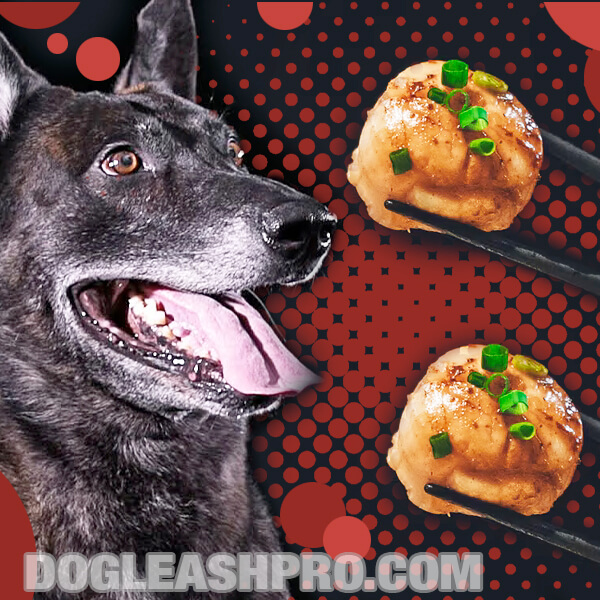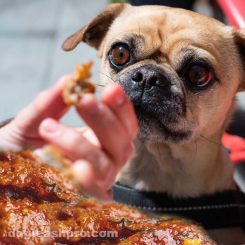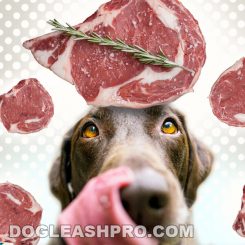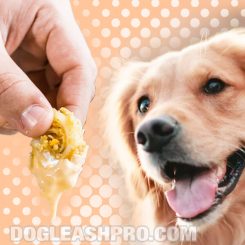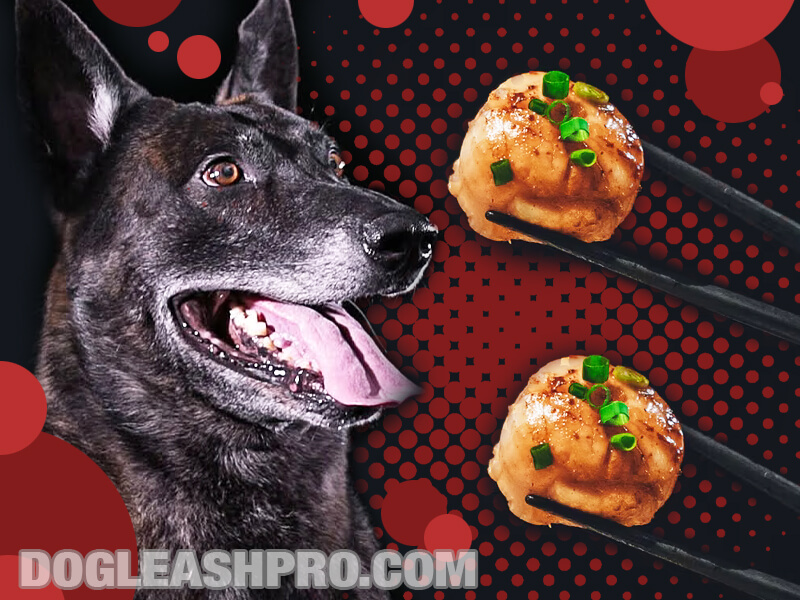
As pet owners, we’re often tempted to share our food with our furry friends. While we’re having that pasta dish with garlic-lemon butter Scallops, our dogs may run over and beg us for some with their cute puppy eyes. Before you share some, you may find yourself wondering, “Can my dog eat Scallops?” Here’s the short answer first.
Can dogs eat Scallops? Yes, dogs can eat cooked Scallops in moderation since cooked Scallops are packed full of nutrients such as magnesium, protein, and potassium. Before offering Scallops to your canine friends, proper preparation is key so that they can enjoy this seafood safely and receive the maximum health benefits from it.
In this article, we’ll go over how to properly prepare the Scallops and any precautions to follow so that your furry friends can safely enjoy this delicious seafood. Let’s dive right in.
Table of Contents
Can dogs have Scallops?
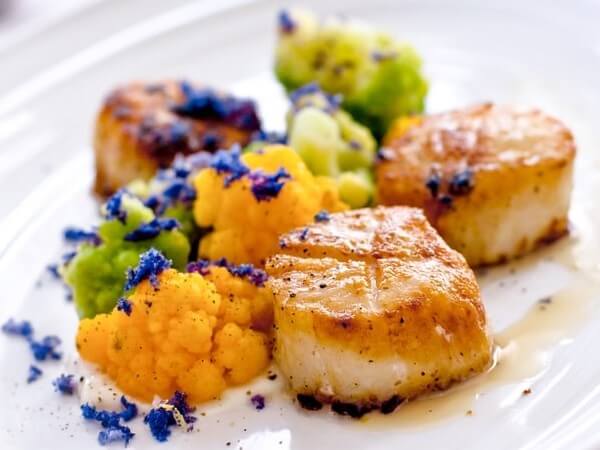
Yes, dogs can have Scallops in moderation. However as mentioned above, proper preparation of the Scallops is key before feeding them to your pooch.
Can dogs eat cooked Scallops?
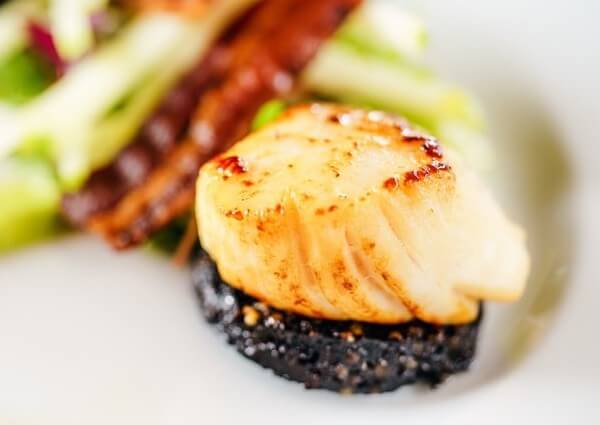
Yes, dogs can eat cooked Scallops. Before feeding your precious pup a small amount of Scallops, you’ll want to be aware of the following first.
Fully cook the Scallops without any added seasonings or ingredients
If you want your dog to simply enjoy the soft part of the Scallops, you’ll want to remove the side muscle of the Scallops first. After you’ve patted the Scallops dry, you’ll want to heat the pan. Avoid using butter and instead go for canine-friendly oils instead like olive oil, sunflower oil, and coconut oil.
Alternatively, you can simply add a little bit of water to the pan. Do not add any seasonings like salt, pepper, garlic, butter, chives, leeks, onions. Serving your dog plain fully cooked Scallops is the best way.
Luckily, Scallops need very little cooking since they cook rather quickly. When the translucent meat turns opaque, the Scallops are fully cooked.
Fun Facts: Many enjoy Scallops in their Brussel Sprouts salad, but is Brussel Sprouts safe for doggy consumption? Check out Can Dogs Eat Brussel Sprouts? The Good and the Gas! to find out!
So, are Scallops ok for dogs?
Plain Scallops are ok for dogs to eat. If the Scallops are pan-seared in butter or seasoned with salt, pepper, garlic, onion, or chives, then they are not ok for dogs.
When dogs consume too much salt, they are at risk of sodium poisoning. Then there are the garlic, onion, or chives which are all toxic to dogs. Garlic and onion can cause poisoning in dogs.
Signs of garlic and onion toxicity include:
- Abdominal pain and tenderness.
- Cramps.
- Anemia.
- Hematuria or blood in the urine.
- Loss of coordination.
- Increase heart rate.
- Dehydration.
- Anorexia.
- Bad breath.
If you suspect your dog has garlic or onion poisoning, contact your vet immediately.
Fun Facts: Lasagna also contains ingredients that are harmful to dogs such as onion, garlic, and pepper. Check out Can Dogs Eat Lasagna? to find out what can happen to dogs when they eat this dish.
Avoid feeding your dog fried or raw Scallops
You may be wondering why your furry friends should avoid both fried and raw Scallops. Below we’ll discuss this in detail so that you’re aware and this will also ensure that there are no accidents or unexpected and expensive emergency medical bills.
Can dogs eat fried Scallops?
No, dogs should not eat fried Scallops. Fried Scallops are not only oily, but they are unhealthy for your dog’s health. Oily food is very fatty and it is an unnecessary part of your dog’s diet.
After consuming some fried Scallops, your dog may get an upset stomach and feel uncomfortable throughout the day. In addition, if you’re not careful and your pooch ingests a lot of fried Scallops, it could affect his or her pancreas.
Eating a lot of fried food can put your canine friends at risk for developing pancreatitis or pancreas inflammation. When this happens, your dog’s organ starts to produce harmful enzymes that can harm his or her intestines.
So try not to feed your dog fried Scallops.
Can dogs eat raw Scallops?
No, dogs should not eat raw Scallops. Raw Scallops are extremely dangerous to dogs. That’s because raw Scallops can contain nasty viruses, bacteria, and parasites.
You can find the following viruses in raw Scallops:
- Parvoviridae.
- Astrovirus.
- Norovirus.
Bacteria that are often found in raw Scallops includes:
- Salmonella spp.
- Escherichia coli.
- Shigella.
Raw Scallops also contain parasites such as:
- Tapeworms.
- Roundworms.
- Trematodes.
Puppies are known to have low metabolism and their stomachs are very sensitive. If your puppy accidentally ingests raw Scallops, monitor him or her very closely. There’s a high chance that he may become sick from eating raw Scallops.
It also takes puppies at least four to five hours to fully digest their food which allows the virus, parasite, and bacteria enough time to grow and strengthen inside their stomach. When this happens, your puppy or dog may have infections.
You might also like: Can Dogs Eat Cornbread?
Are Scallops bad for dogs?
As we can see, Scallops are bad for dogs if they are raw and not fully cooked. Only feed your dog fully cooked Scallops. Avoid raw Scallops at all costs.
Raw Scallops can contain bacteria, parasites, and viruses which can cause chronic diseases in both dogs and puppies. Chronic diseases our puppies and dogs can get from eating raw Scallops include:
Acute abdominal pain
Parasites like trematodes and tapeworms can cause abdominal pain in dogs. Since these parasites can easily be found in raw seafood like Scallops, it’s best not to feed your pooch raw Scallop.
Some recommend freezing the raw Scallops so that the microorganisms will die from the cold, however, when it comes to our dog’s health, it’s best to err on the side of safety and just cook the Scallops fully before feeding them to your pups.
Vomiting
It’s natural for your dog to vomit after eating raw seafood that has been contaminated with viruses, bacteria, fungus, and parasites. It’s the body’s natural way of trying to get rid of the toxins.
Cholera
Raw Scallops may contain vibrio cholera which is responsible for cholera. If your K9 friends consume a lot of raw Scallops without you knowing, they can have really bad diarrhea.
Diarrhea can cause your dog’s body to lose water and your canine friend may become severely dehydrated.
RELATED: My Dog Has Diarrhea But Is Acting Fine
Gastroenteritis
Viruses, bacteria, fungus, and parasites can cause gastroenteritis in dogs. All of these can be found in raw Scallops.
Having gastroenteritis is extremely uncomfortable and painful because the digestive tract becomes inflamed. Dogs may vomit, have explosive diarrhea, and have abdominal pain.
Meningitis
Although meningitis is a pretty rare disease in canines, some dog breeds are more prone to it than others. These dog breeds are Beagles, German Shorthaired Pointers, and Bernese Mountain dogs.
Meningitis is usually caused by fungus, viruses, and bacteria. Consuming raw Scallops that have been exposed to dirty sewage water may contain bacteria and viruses that may cause meningitis in dogs.
Septicaemia
When dogs eat raw Scallops, they may be at risk of viruses such as Vibrio cholerae and Vibrio vulnificus. When these viruses enter your dog’s bloodstream, it can cause blood poisoning and lead to high fever and very low blood pressure in dogs.
If you suspect your four-legged friends aren’t feeling well after accidentally eating raw Scallops or may have Septicaemia, call your vet right away. Immediate medical treatment is necessary or these viruses could put your dog’s life at risk.
Viral hepatitis
Scallops that are grown in a dirty environment or near sewage water may be exposed to the Hepatitis A virus. When dogs eat raw Scallops that have been exposed to viral hepatitis, they may also get this virus too.
So, if you have puppies, be extra careful when feeding them Scallops. Make sure the Scallops are fully cooked and not raw before letting your pups consume them.
Keep in mind that you can’t control the environment the Scallops were in prior to being in your kitchen. The above parasites, bacteria, and viruses could come into contact with the Scallops from the sea, ocean, or environment. They can even get into the Scallops during transportation, storage, and at the grocery store.
Are Scallops good for dogs to eat?
Yes, Scallops are good for dogs in moderation and if the Scallops are fully cooked. Remember to only allow your pooch to eat the white and orange part only and not the frilly membrane, black stomach sac, or the shell as these are toxic to dogs.
Scallops are packed full of all the goodness that your dogs need. Here is the nutritional profile of steamed or boiled Scallops:
Nutritional profile of cooked Scallops (1oz or 28 grams)
| Name, Unit | Amount |
| Calories, cal | 38.8 |
| Sodium, mg | 187 |
| Carbohydrate, g | 1.8 |
| Total Fat, g | 0.278 |
| Protein, g | 6.8 |
| Potassium, mg | 104 |
| Calcium, mg | 3.4 |
| Iron, mg | 0.193 |
| Magnesium, mg | 12.5 |
| Phosphorus, mg | 141 |
| Zinc, mg | 0.513 |
| Copper, mg | 0.011 |
| Selenium, µg | 7.23 |
| Thiamin, mg | 0.004 |
| Riboflavin, mg | 0.008 |
| Niacin, mg | 0.357 |
| Vitamin B-6, mg | 0.037 |
| Folate, µg | 6.8 |
| Choline, mg | 36.6 |
| Vitamin B-12, µg | 0.717 |
| Vitamin A, µg | 0.567 |
From this nutritional profile, we can see that with just 1 ounce of cooked Scallop, there are almost 39 calories and 187 mg of sodium. This is why it’s crucial that dogs eat cooked Scallops in moderation. Eating too many Scallops or eating this seafood regularly puts your dog at risk for weight gain and salt poisoning.
With that said, let’s discuss why cooked Scallops are good for dogs. Let’s start with protein.
Protein
In just 1 ounce of cooked Scallop, there are almost 7 grams of protein! All dogs need protein to have strong and healthy muscles, organs, and even skin. Without a sufficient amount of protein intake, it helps to keep your four-legged friends lean and energetic.
Magnesium
All dogs also need an essential mineral called magnesium. In just 1oz of cooked Scallop, there is 12.5mg of magnesium. This key nutrient helps dogs have proper heart functions, aid in muscle growth, and facilitate nervous system signaling.
Dogs that have magnesium deficiency (or hypomagnesemia) may experience heart issues, kidney damage, malnutrition, and cardiac issues.
Potassium
Potassium is just as important to dogs as magnesium. Our K9 friends need potassium because this crucial mineral helps aid in the transfer of electric signals between the muscles, nerves, and organs. It also assists in the transfer of nerve impulses throughout your dog’s body.
Fun Fact: Artichokes also contain tons of potassium. Check out Can Dogs Eat Artichokes? to find out what other nutrients they contain.
Can dogs eat Scallops and shrimp?
Yes, dogs can eat Scallops and shrimp in moderation as long as both the Scallops and the shrimps are fully cooked with no added seasonings.
As mentioned above, fully cooked Scallops are safe and healthy for dogs and they contain tons of essential nutrients such as magnesium, potassium, protein, selenium, calcium, folate, vitamin A, and B vitamins.
Fully cooked shrimps are also nutritious to dogs. Not only are they low in carbs, calories, and fat, but also they are packed full of antioxidants, phosphorous, and B vitamins. Plus, cooked shrimps are delicious and your dog will enjoy them.
So, can dogs eat Scallops?
As we can see, it’s important that dog owners cook the Scallops fully before offering some to their furry family members. When it comes to sharing human foods with our K9 friends, it’s best to keep the food plain and simple. Any added seasonings that we find tasty may irritate our dog’s tongue, throat, and stomach.
Some seasonings and ingredients are outright toxic to dogs. If you’re ever concerned about how a certain food may affect your dog’s health, we highly recommend that you reach out to your dog’s vet. Your vet knows your dog best and will be able to answer any question, big or small. We hope you found this helpful and informative!
DISCLAIMER: THIS WEBSITE DOES NOT PROVIDE MEDICAL ADVICE
The information, including but not limited to, text, graphics, images and other material contained on this website are for informational purposes only. No material on this site is intended to be a substitute for professional veterinary advice, diagnosis, or treatment. Always seek the advice of your veterinarian or other qualified health care provider with any questions you may have regarding dietary needs.
Resources:
https://en.wikipedia.org/wiki/Scallop
https://www.petpoisonhelpline.com/poison/garlic/

With over five years of specialized experience as an animal writer, my expertise lies in dog nutrition, health, behavior, grooming, and training. I am dedicated to delivering helpful and informative content that caters to the well-being of our furry friends. My primary goal is to empower pet owners with knowledge and ensure our canine companions thrive in health and happiness. In my free time, I love volunteering at local dog rescue centers.
